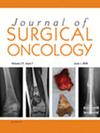Relationship of Surgical Approach With Financial Toxicity in Patients With Resected Lung Cancer
IF 2
3区 医学
Q3 ONCOLOGY
引用次数: 0
Abstract
IntroductionMinimally invasive surgery (MIS) reduces lengths of stay, complications, and potentially perioperative hospital costs. However, the impact of MIS on financial toxicity (FT), defined as the costs resulting from oncologic care and their negative effects on quality of life, in patients with lung cancer is unknown. Our objective was to investigate the association between surgical approach and FT in this population.MethodsA single‐institution study was performed evaluating resected lung cancer patients (2016–2021). FT was assessed using the Comprehensive Score for Financial Toxicity (COST) questionnaire. The relationship between surgical approach (MIS vs. thoracotomy) and FT was evaluated using propensity score‐matched (PSM) regression analysis. A sensitivity analysis involving the entire cohort was also performed using an inverse probability‐weighted generalized linear model.ResultsAs reported previously, of 1477 patients surveyed, 463 responded (31.3%) with FT reported in 196 patients (42.3%). Resection was performed by thoracotomy in 53.3% (手术方法与切除肺癌患者经济毒性的关系
导言微创手术(MIS)缩短了住院时间,减少了并发症,并可能降低了围手术期的住院费用。然而,微创手术对肺癌患者经济毒性(FT)的影响尚不清楚,经济毒性是指肿瘤治疗产生的费用及其对生活质量的负面影响。我们的目标是调查这一人群中手术方式与经济毒性之间的关系。方法对切除的肺癌患者(2016-2021 年)进行了评估,并开展了一项单一机构研究。财务毒性综合评分(COST)问卷对财务毒性进行了评估。使用倾向得分匹配 (PSM) 回归分析评估了手术方式(MIS 与开胸手术)与财务毒性之间的关系。此外,还使用反概率加权广义线性模型进行了涉及整个队列的敏感性分析。结果如前所述,在接受调查的1477名患者中,有463名患者(31.3%)做出了回应,196名患者(42.3%)报告了FT。53.3%的患者(n = 247)通过开胸手术进行切除,其余患者(n = 216,46.7%;视频辅助胸腔镜手术 [VATS] = 115;机器人辅助 = 101)通过 MIS 进行切除。接受 VATS 和机器人辅助手术的患者的 FT 没有差异(P = 0.515)。在 PSM 分析中,MIS 与 FT 无关(几率比 [OR]:0.980,95% 置信区间 [CI]:0.628-1.533, p = 0.929).结论与 MIS 相比,开胸手术与切除肺癌患者的 FT 无关。虽然 MIS 有多种益处,但似乎并不是减轻该人群 FT 的有效策略。
本文章由计算机程序翻译,如有差异,请以英文原文为准。
求助全文
约1分钟内获得全文
求助全文
来源期刊
CiteScore
4.70
自引率
4.00%
发文量
367
审稿时长
2 months
期刊介绍:
The Journal of Surgical Oncology offers peer-reviewed, original papers in the field of surgical oncology and broadly related surgical sciences, including reports on experimental and laboratory studies. As an international journal, the editors encourage participation from leading surgeons around the world. The JSO is the representative journal for the World Federation of Surgical Oncology Societies. Publishing 16 issues in 2 volumes each year, the journal accepts Research Articles, in-depth Reviews of timely interest, Letters to the Editor, and invited Editorials. Guest Editors from the JSO Editorial Board oversee multiple special Seminars issues each year. These Seminars include multifaceted Reviews on a particular topic or current issue in surgical oncology, which are invited from experts in the field.

 求助内容:
求助内容: 应助结果提醒方式:
应助结果提醒方式:


